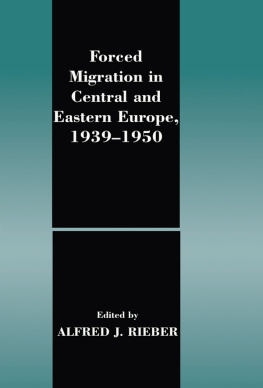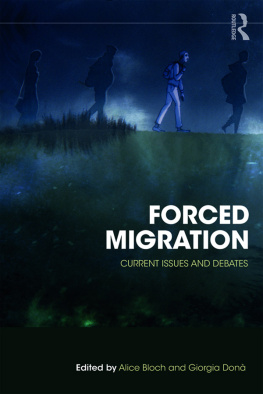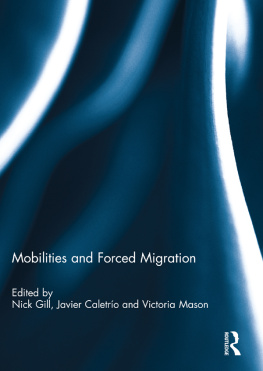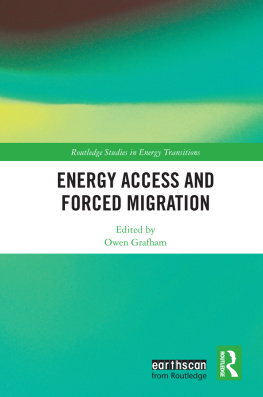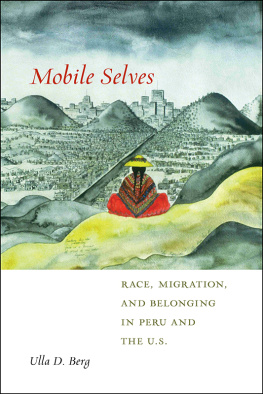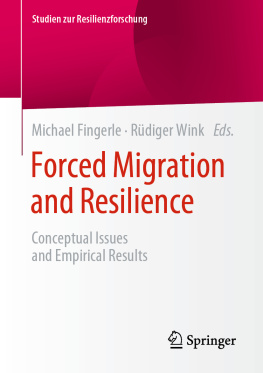
Emotions and Belonging in Forced Migration
Emotions and Belonging in Forced Migration takes a sociology of emotions approach to gain a better understanding of the present situation of forced migration.
Furthermore, it helps to bring the voices and views of forced migrants to academic and public debates in Western society, where they have been generally absent and often investigated with predefined concepts and categories based on theories having little relevance to their cultural and social experiences. This work, however, is based on an inductive methodology that carefully carries the voices of forced migrants throughout the research. Therefore, it will be of interest for various audiences from different disciplines in social sciences, as for any readers seeking to learn more about the refugees in his building, neighbourhood, city, or country.
Finally, it provides an insightful lens for those who wants to know more about Syria and the Arab uprisings after 2010. It is the first study of what Syrians feel during the entirety of their difficult ordeal fleeing Syria, traversing different countries in the global South, and landing in Western ones. No other book treats this thematic focus with the same geographic and temporal breadth.
Basem Mahmud is a Marie Sklodowska Curie fellow at the University of Granada, Spain. He holds a PhD in sociology from Free University Berlin. He was a visiting researcher at the Migration Research Center (MiReKoc) at Ko University in Istanbul (20202021).
Routledge Advances in Sociology
Anxiety in Middle-Class America
Sociology of Emotional Insecurity in Late Modernity
Valrie de Courville Nicol
Boredom and Academic Work
Mariusz Finkielsztein
The Emotions in the Classics of Sociology
A Study in Social Theory
Edited by Massimo Cerulo and Adrian Scribano
Emotions and Belonging in Forced Migration
Syrian Refugees and Asylum Seekers
Basem Mahmud
Languages and Social Cohesion
A Transdisciplinary Literature Review
Gabriela Meier and Simone Smala
The Social Construction of the US Academic Elite
A Mixed Methods Study of Two Disciplines
Stephanie Buyer
Domestic Economic Abuse
The Violence of Money
Supriya Singh
For more information about this series, please visit: www.routledge.com/Routledge-Advances-in-Sociology/book-series/SE0511
Emotions and Belonging in Forced Migration
Syrian Refugees and Asylum Seekers
Basem Mahmud

First published 2022
by Routledge
2 Park Square, Milton Park, Abingdon, Oxon OX14 4RN
and by Routledge
605 Third Avenue, New York, NY 10158
Routledge is an imprint of the Taylor & Francis Group, an informa business
2022 Basem Mahmud
The right of Basem Mahmud to be identified as author of this work has been asserted by him in accordance with sections 77 and 78 of the Copyright, Designs and Patents Act 1988.
All rights reserved. No part of this book may be reprinted or reproduced or utilised in any form or by any electronic, mechanical, or other means, now known or hereafter invented, including photocopying and recording, or in any information storage or retrieval system, without permission in writing from the publishers.
Trademark notice: Product or corporate names may be trademarks or registered trademarks, and are used only for identification and explanation without intent to infringe.
British Library Cataloguing-in-Publication Data
A catalogue record for this book is available from the British Library
Library of Congress Cataloging-in-Publication Data
Names: Mahmud, Basem, author.
Title: Emotions and belonging in forced migration: Syrian refugees
and asylum seekers / Basem Mahmud.
Description: Abingdon, Oxon; New York, NY: Routledge, 2021. |
Series: Routledge advances in sociology |
Includes bibliographical references and index.
Identifiers: LCCN 2021014122 (print) | LCCN 2021014123 (ebook) |
ISBN 9781032018607 (hbk) | ISBN 9781032018621 (pbk) |
ISBN 9781003180821 (ebk)
Subjects: LCSH: Forced migrationSyria. |
Political refugeesSyria. | RefugeesSyriaSocial conditions.
Classification: LCC HV640.4.S97 M34 2021 (print) |
LCC HV640.4.S97 (ebook) | DDC 956.9104/231dc23
LC record available at https://lccn.loc.gov/2021014122
LC ebook record available at https://lccn.loc.gov/2021014123
ISBN: 978-1-032-01860-7 (hbk)
ISBN: 978-1-032-01862-1 (pbk)
ISBN: 978-1-003-18082-1 (ebk)
DOI: 10.4324/9781003180821
Typeset in Times New Roman
by Newgen Publishing UK
To my father Muhiedin Mahmud who was forcibly disappeared by the Syrian regime when I was 13 years old and died in one of its human slaughterhouses when I was 19: I love you, and I am so proud of you.
Contents
I want to express my profound gratitude to my supervisors, Prof. Dr. Christian von Scheve and Prof. Dr. Rosa Soriano Miras, for trusting me to do this research and for listening, commenting, and providing me with crucial recommendations that saved me, especially when I felt stuck. Furthermore, I would like to thank the DAAD (German Academic Exchange Service) for funding this research for four and a half years. I would also thank all those colleagues at the Institute of Sociology at Freie Universitt Berlin who provided me with helpful feedback during my first months of research. The same for Prof. Dr. Ruth Mas and Jordan Kynes for their comments and helpful conversations on many questions and concerns that I had at that time about my research. I would also like to express my gratitude to Prof. Dr. Jrgen Gerhards for his kindness and encouragement when I first inquired about the possibility of applying for an individual doctorate, ultimately setting me on this long and rewarding path. Furthermore, I am also very thankful for Prof. Dr. Birgitt Rttger-Rssler, Dr. Daniel Drewski, Prof. Dr. Ugur mit ngr, Prof. Dr. Marlene Solis, and Prof. Dr. Eduardo Bericat Alastuey for their help, comments, and recommendations. Likewise, for Tammam Alomar, and the Routledge team: Emily Briggs and Lakshita Joshi. I have no words to express my gratitude to my family, my mother and brother, for their constant support. Furthermore, I will never forget the interest, sincerity, and passion on the faces of all those who helped me during my data production process. Finally, a big thanks to the 33 participants who trusted me and opened their hearts to me. Without you, there would be no research. Though I am responsible for every word written in this thesis, we constructed this theory together.
DOI: 10.4324/9781003180821-1
My interest in the study of emotions began during my study at the University of Granada in Spain, the country to which I fled from Syria in 2002. Even as a migrant sociology student interested in migration studies, my curiosity was not satisfied because I felt that these studies failed to capture the migration experience. Later, I understood that this failure was due to the dominance of macro perspectives that cannot account for peoples subjectivities. Even those studies adopting micro perspectives usually focus on rational calculation, neglecting the importance of forced migrants emotions. I was totally immersed in my new life in Spain. At the time, Syria was for me a place where nothing important occurs! The Syrian uprising in 2011 was the storm that turned my attention again toward Syria. This was not an exceptional case. Indeed, many of the Syrians in exile lived this Syrian turn. There are great things happening there and a big change is coming that will soon defeat one of the most totalitarian regimes in the world. We were astonished by the peoples innovative strategies, courage, and firm will to continue the fight in the face of bombings, torture, sieges, and attacks with all kinds of weapons (including chemical). Syrians inside and outside the country were shocked: how can the international community stand by and watch all of this without taking any serious initiatives to protect the people?! The other shock that affected me personally was the reaction of Western countries toward the arrival of asylum seekers. I came to see the term




